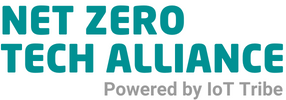The Net Zero Tech Alliance convenes key stakeholders from industry, government, academia, R&D and the startup ecosystem, curates discussions around what can be done and mobilises the technologies that can drive exponential progress towards common goals.
It creates a structured environment in which resources, know-how and data can be pooled to define and deliver outcome-focused collaborations. This will achieve greater impact, more quickly, with less risk and more efficiently than individually to decouple economic growth from the intensive use of energy and resources.

Facilitate climate action at scale, addressing scope 3 emissions, by providing the tools and mechanisms to orchestrate resources and articulate collaboration between leading stakeholders from multiple verticals and geographies
Provide rapid access to a curated ecosystem of next-gen net zero solutions, fast-tracking discovery, validation, adoption, and scaling of the technologies across operations.
Create an environment in which employees and other stakeholders can be part of the conversation, gain new skills and understand the impact they can have on organisational net zero targets.
Lowering the barriers to trying new approaches to decarbonisation by aggregating demand amongst industry players and safely sharing data on performance to benchmark co-create, improve and scale.
De-risking the experimentation that is inherent in exploring new approaches to achieve significant change in operations and behaviour.
Measuring the organisation’s full carbon footprint, through tools that can influence decarbonisation choices and reliably report results.
Work with members to chart your technology roadmap to understand which technologies will have the biggest impact on your net zero journey, now and in the future.
Trial technologies to prove their impact on your scope 3 emissions and de-risk experimentation through collaborative outcome-driven initiatives and validation of pilot results.
Lead or join supported regular working groups on one or more of the scope 3 focus areas to drive action in your organisation.
From conferences, to roundtables, join curated business environments to network, discuss challenges, co-create solutions, share best practices, and explore collaborations.
Benefit from collective market intelligence and market trends and safely share data on performance to benchmark, co-create, improve and scale.
Build the skills and capabilities needed to reach your net zero targets, internally and across the value chain though access to curated on-line ESG training.
Explore collaborations across the Alliance, from corporates to academia and R&D, startups and scaleups, investors, government, and other enablers and stakeholders.
Communicate your organisation’s commitment to true decarbonisation and contribute to the Alliance’s contribution to net zero advocacy and policy.
Measure your carbon footprint, through tools that can influence decarbonisation choices and reliably report results. Benchmark your efforts against your peers.
The Greenhouse Gas protocol defines scope 3 emissions as those that are non-scope 2 indirect emissions that “occur in the value chain of the reporting company, including both upstream and downstream emissions”. It may sound simple, but taking action to reduce emissions arising from indirect activity is notoriously complex.
According to GHG, value chain emissions often represent a company’s biggest greenhouse gas impacts, which means companies have been missing out on significant opportunities for improvement. A full inventory enables companies to focus their efforts on the greatest GHG reduction opportunities.
This is also where collaboration can yield significant results, trialling different approaches and technologies to assess environmental impact.

Chances are that if you are reading this, you already have a plan and actions in place to reduce your scope 1 and 2 emissions. Tackling scope 3 is much harder because:
The Net Zero Tech Alliance will lower the barriers to acting on scope 3 by facilitating collaborative action between members to trial new approaches and technologies that reduce emissions. Base lines are calculated, results are independently verified.
* UN Global Compact Network UK
The time is now. The path to achieving your net zero ambitions, is through disruptive technologies.
